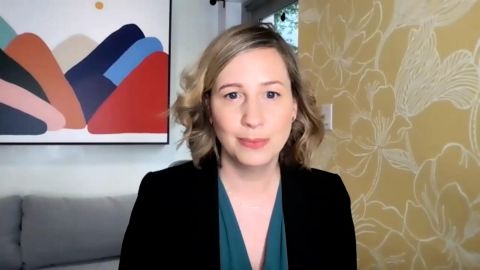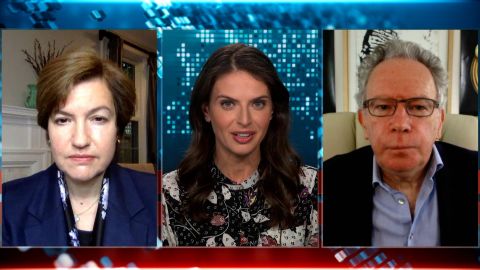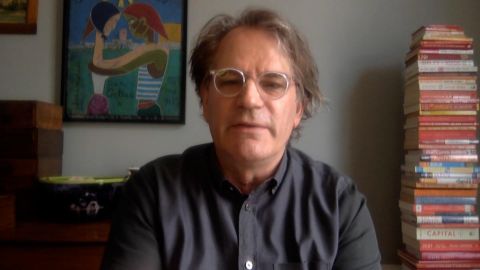Read Transcript EXPAND
BIANNA GOLODRYGA:
And now, a conversation about how to navigate the changing media landscape as we grapple with disinformation, polarization and cancel culture. What is
the place of opinion journalism? Kathleen Kingsbury is a Pulitzer Prize winning journalist. And this year, she took over as opinion editor in “The
New York Times.” Here she is speaking with our Walter Isaacson about modernizing the digital age.
(BEGIN VIDEO CLIP)
WALTER ISAACSON: Thank you, Bianna. And, Kathleen Kingsbury, welcome to the show.
KATHLEEN KINGSBURY, OPINION EDITOR, THE NEW YORK TIMES: Thank you so much for having me.
ISAACSON: So, you’ve taken over the opinion section of “The New York Times” just at a time when sub stack is coming along and having great
opinion essays, podcasts are hitting us. We’re entering this new age of opinion journalism around the web. Tell me, how does that affect what
you’re going to do? How are you modernizing the opinion sections of “The New York Times”?
KINGSBURY: Thank you. It’s a great question. You know, I think an opinion just like our newsroom really always aims to have the highest quality of
journalism across the most innovative form. And in opinion, we have spent the last three years really modernizing our report. We now have a video
team, an audio team, a newsletter team, a graphics team. It’s a really big investment by the “Times” to make sure we are reaching as wide of an
audience as possible.
But it also hasn’t really changed anything about the fundamentals of what we’re trying to do day to day. We are trying to be the most powerful report
there is in the world for ideas journalism. We are trying to elevate honest debate. We are going to serve our audiences with opinions that they agree
with, opinions that they don’t agree with. Opinion that we don’t disagree with sometimes. But we think that’s important for, ultimately, helping them
wrestle with and grapple with the challenges of a changing world.
ISAACSON: You talk about providing opinions that your readers may not agree with, you don’t agree with. You’ve changed the name op-ed to guest
columnist. But there seems to be some thought that you’re constrained at times for how far you can go, especially to the right after Senator Tom
Cotton wrote an editorial that caused your predecessor to have to step down.
I know those were complicated situations, but do you feel that “The New York Times” is constrained especially when it comes to very concerned and
populist voices?
KINGSBURY: We are constrained in the fact that we don’t print things that are inaccurate. And sometimes some of the voices on to the right are making
claims that we simply can’t fact-check. That said, I really don’t feel constrained. I mean, we have, in our report, almost a daily basis a wide
range of voices and viewpoints. We are trying very hard to serve as wide an audience as we can.
Just a small example, for a New York City issue, we had an editorial that was suggesting that it was a mistake by the prime organization here to
exclude police officers in uniform from marching in their annual Pride Parade. Tomorrow, we’re going to have an essay by Roxane Gay talking about
why it’s so important that police officers come to the parade but out of uniform.
ISAACSON: Well, let me push where the line may be. I mean, would you be comfortable on running a guest opinion piece against vaccination, say an
anti-vaxxer?
KINGSBURY: That’s a hard one. Probably not actually. I mean, you know, at our core, we don’t want to misrepresent science. And when it comes to the
Anti-Vaccine Movement, they often try to push dangerous narratives around science and what we know to be true about public health.
That said, you know, the Anti-Vaccine Movement is a particularly interesting one because it’s become so political. And so, there are people
— I think there are arguments that we could have in our report that explain people’s hesitancies around getting vaccinated without it
necessarily sending the wrong signals around the science here.
I’ve been watching your coverage as well as opinion of the mayor’s race in New York City. And the opinion section seems to be far more transparent
than the old days where you never could figure out how do they make that decision. And we’re watching interview after interview with the male
candidates that you all have been doing. Tell me about how conscious it is that you’re changing the transparency of how you make your decisions.
KINGSBURY: I think given the mistrust in media we’ve seen in recent years. It puts a really big onus on us to be as transparent as possible and as
inclusive about how and why we do the journalism that we do. So, you mentioned the change to guest essay from op-ed. We made that decision
because “The New York Times” was the pioneer of the modern op ed page. It’s a legacy we’re very proud of. It expanded the opinion journalism ecosystem
really dramatically when it was introduced in 1970.
That said, it really is a print construction. Op ed meant literally the page opposite of the editorial page. In the modern digital era, not very
many people understand what even the editorial pages not — you know, regardless of the op ed page. And so, we decided to find a phrase that was
clearer, that provided more context and that created more differentiation between news and opinion.
Readers and our research groups really immediately grasped what guest essays that they meant, and in particular, they understood what the
relationship between the writer and “The New York Times” was. These are outside writers who are contributing their authority, their expertise or
their experience on the topics that they’re writing about.
ISAACSON: Do you we naming it as guest essay and making it far clear what the relationship is with “The New York Times,” does that allow you to have
a broader platform, so to speak, in which a Tom Cotton or Marjorie Taylor Greene could write something and “The New York Times” would feel more
comfortable printing it, even if you thought some of the facts might not be totally correct?
KINGSBURY: No. I mean, at the end of the day, we don’t publish things that are factually incorrect. That said, I do think that there are arguments
that both Tom Cotton or Marjorie Taylor Greene could make that we would be willing to publish. For instance, Tom Cotton wrote a piece about Greenland
for us just a few months before the op ed that we ran that big proved to be controversial.
I could have seen even that op ed from June of 2020 being something that we could have run if there was a really central idea to it. Tom Cotton is
military veteran. He could have spoken from his own experience in a deep way about why military officers and — are more better trained to deal with
crowd control than your average police officer.
That said, there was a whole process breakdown around that op ed from June 2020. Look, I’m even calling him op ed still, guess essay. So, you know,
and that is really what we are trying to avoid and prevent going forward. It’s part of a huge effort that we’ve undertaken to provide, like I said,
more clarity, more context about why we are choosing the arguments and ideas that we want to have in our section.
In addition to changing the name, we’ve taken steps such as providing more biographical information about the author of every piece that we run as
well as presenting to our audiences the number of pieces that we are running from many different angles on whatever the most important topics of
the day are.
ISAACSON: One of your writers in the opinion section that I enjoy, find provocative and always stimulating is Bret Stephens. But he had a run in
with you and your team recently when he wrote something, a guest — I mean, a column on Don McNeil, a former “New York Times” writer, it was a
complicated issue. But he felt constrained. And I think you spiked his column, walk me through that one.
KINGSBURY: Sure. Of course, I mean, we welcome, as you would see in the aftermath of the Tom Cotton situation, we welcome our columnist to weigh in
on Times’ situations, particularly when they become major news events. You saw that with Bret wrote, what I thought was a very well-done column, about
1619, and what he saw as the flaws in that project back in November of 2020.
You know, again, I welcome that. I thought he brought a lot of journalistic integrity to how he did that column. And I was glad that the opinion
section could weigh in on that debate. That said the bar for weighing in on Times, particularly personnel issue is really high in my mind. And, you
know, I think that what happened, specifically with the column you’re referring to about Don McNeil was that I don’t think that Bret met that
bar.
And so, I let him know that we weren’t going to publish it. You know, it later was leaked and, you know, you can find it in — I think it was
printed in “New York Post.” So, people can find it and read it and judge for themselves. But in the moment, when there are a lot of fast-moving
things happening around Donald McNeil and his future at “The New York Times”, it didn’t feel appropriate to let Bret weight what — on what was a
lot of speculation in that moment.
ISAACSON: You talked about a moment ago, “The 1619 Project,” which was this massive project that the newspaper undertook, looking at the legacy of
the first of slavery in the systems of America. That’s engendered huge debate. Do you feel comfortable that the opinion section of “The New York
Times” has weighed in fully on all sides of that debate?
KINGSBURY: I do actually. You know, we have run more than half a dozen pieces about 1619, which was an extraordinary project. It really changed
the way so many Americans viewed our history and I think was just spectacular.
That said, we have run pieces that critique it like Bret’s and we have run pieces that have been (INAUDIBLE) and then we’ve read — run pieces that
take a small angle in the project. And we even had one of our columnists, Jamelle Bouie, who is part of that project and who tried to eliminate why
there is so much the base and conversation around 1619.
ISAACSON: We talk often about cancel culture and deep platforming people. Do you think that one of your goals can be and should be to resist that
temptation of what is sometimes labeled cancel culture or deplatforming?
KINGSBURY: I do. I do think that it’s quite important to make sure that we are always bold and always courageous about interrogating ideas, even bad
ones, maybe especially bad ones, because I think that is one of the most effective ways that we can, you know, bat them down when necessary.
That said, I think that what we’re seeing is a really complicated conversation. And I do think it’s part of my department’s mission to make
sure that we are delving into it and trying to expose the many arguments. I mean, cancel culture, that means something’s totally different depending on
who you ask. And so, trying to make sure that we are talking about all the ways that people see that and making sure that we are, you know, frankly,
pushing back on it as often as possible is definitely part of what we are trying to do this year.
ISAACSON: Your audience is probably, let me make a sweeping generalization, more on the progressive or left or central left of the
spectrum when it comes to reading “New York Times” editorials. And historically, “The New York Times” has been a voice somewhat of the left or
center left or progressivism. And even in the argument, I notice so many of the things tend to be arguments like are Republicans driving democracy into
a ditch type argument, which seem to come from a particular perspective.
Does that make sense? Is that something you would just say, yes, we do have a general world viewpoint and we’re proud of it, or is it something that
you feel should be righted or changed?
KINGSBURY: Interesting. One of my earliest memories is having a show and tell preschool about going to the voting booth and putting the lever for
Ronald Reagan. I think — I share that story because I think that it creates a perception that some people will feel confirms many of the things
that they think about me. And then, you know, just as the fact that I won a Pulitzer Prize for a series that called for a $15 minimum wage and better
treatment for immigrant workers.
I’d say that story because it’s really irrelevant what my personal worldview is or even what the section’s worldview is. At the end of the
day, if we want a healthy thriving democracy, people need to encounter views that they both agree with and disagree with. I don’t think that it’s
entirely fair to suggest that we are a progressive organization, and I would push back on that. We are not representative of any political
parties, especially. We are running viewpoints.
For instance, last summer, we ran this very thoughtful piece by Jeffrey Rosen, who you’ll remember was the deputy attorney general for Donald
Trump, on why we needed the death penalty. And we are trying to do that every day. I can give you countless examples from the last month of
viewpoints that run counter to the idea that we are running progressive pieces exclusively.
And so, you know, that’s really what I’m trying to achieve every day because I think it’s really important. I think that we saw 74 million and
people vote for Donald Trump and Mike Pence in the last election. And for us to have a real dialogue with those people who are still living in our
country, we need to be able to publish pieces that speak to them to.
ISAACSON: Katie Kingsbury, thank you so much for joining our show.
KINGSBURY: Thank you. Thank you so much for having me
About This Episode EXPAND
Susan Glasser; Fintan O’Toole; Bartlett Sher; Kathleen Kingsbury; John Green
LEARN MORE



